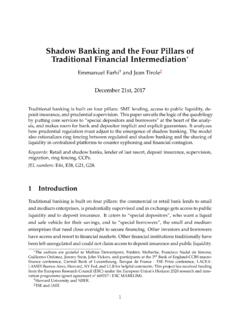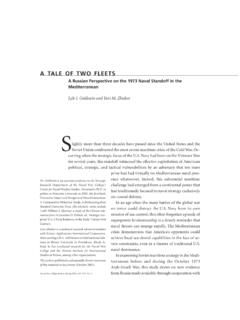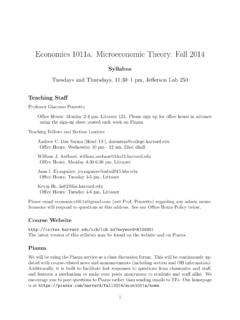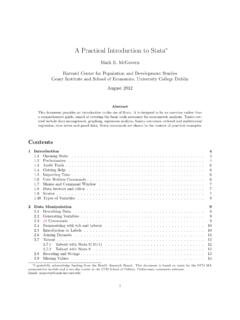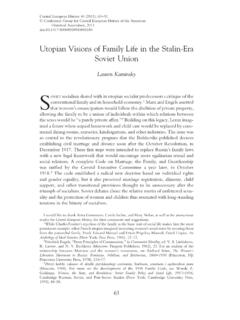Transcription of Google Effects on Memory: Cognitive Consequences of …
1 DOI: , 776 (2011);333 Science, et SparrowInformation at Our FingertipsGoogle Effects on Memory: Cognitive Consequences of Having This copy is for your personal, non-commercial use only. clicking , clients, or customers by , you can order high-quality copies for yourIf you wish to distribute this article to others the guidelines can be obtained byPermission to republish or repurpose articles or portions of articles ): August 23, 2011 (this infomation is current as ofThe following resources related to this article are available online at of this article at: including high-resolution figures, can be found in the onlineUpdated information and services, can be found at: Supporting Online Material #relatedfound at:can berelated to this article A list of selected additional articles on the Science Web sites collections:This article appears in the following registered trademark of AAAS.
2 Is aScience2011 by the American Association for the Advancement of Science; all rights reserved. The title CopyrightAmerican Association for the Advancement of Science, 1200 New York Avenue NW, Washington, DC 20005. (print ISSN 0036-8075; online ISSN 1095-9203) is published weekly, except the last week in December, by theScience on August 23, from Acknowledgments:The present study was funded byNIH grants RO1 MH086563 to and RO1 MH058847 to We thank E. Wang,A. Shang, and N. Nystrom for expert animal careand E. Hargreaves, M. Yanike, and M. Shapirofor helpful comments. The authors declare nocompeting financial interests. and the experiments and wrote the performed the experiment and analyzedthe Online and MethodsSOM TextFigs. S1 to S7 Tables S1 to S5 References (24 35)11 April 2011; accepted 21 June Effects on Memory: Cognitive Consequences of HavingInformation at Our FingertipsBetsy Sparrow,1*Jenny Liu,2 Daniel M.
3 Wegner3 The advent of the Internet, with sophisticated algorithmic search engines, has made accessinginformation as easy as lifting a finger. No longer do we have to make costly efforts to find thethings we want. We can Google the old classmate, find articles online, or look up the actorwho was on the tip of our tongue. The results of four studies suggest that when faced withdifficult questions, people are primed to think about computers and that when people expect tohave future access to information, they have lower rates of recall of the information itself andenhanced recall instead for where to access it. The Internet has become a primary form of externalor transactive memory, where information is stored collectively outside a development that would have seemedextraordinary just over a decade ago, manyof us have constant access to information.
4 Ifwe need to find out the score of a ball game,learn how to perform a complicated statisticaltest, or simply remember the name of the actressin the classic movie we are viewing, we needonly turn to our laptops, tablets, or smartphonesand we can find the answers immediately. It hasbecome so commonplace to look up the answerto any question the moment it occurs that it canfeel like going through withdrawal when wecan t find out something immediately. We areseldom offline unless by choice, and it is hard toremember how we found information before theInternet became a ubiquitous presence in ourlives. The Internet, with its search engines suchas Google and databases such as IMDB and theinformation stored there, has become an externalmemory source that we can access at any information externally is nothing par-ticularly novel, even before the advent of com-puters.
5 In any long-term relationship, a teamwork environment, or other ongoing group, peo-ple typically develop a group or transactive mem-ory (1), a combination of memory stores helddirectly by individuals and the memory storesthey can access because they know someonewho knows that information. Like linked com-puters that can address each other smemories,people in dyads or groups form transactive mem-ory systems (2,3). The present research exploreswhether having online access to search engines,databases, and the like, has become a primarytransactive memory source in itself. We investi-gate whether the Internet has become an ex-ternal memory system that is primed by the needto acquire information. If asked the questionwhether there are any countries with only onecolor in their flag, for example, do we thinkabout flags or immediately think to go onlineto find out?
6 Our research then tested whether,once information has been accessed, our internalencoding is increased for where the informationis to be found rather than for the experiment 1, participants were testedin two within-subject conditions (4). Partic-ipants answered either easy or hard yes/notrivia questions in two blocks. Each block wasfollowed by a modified Stroop task (a color-naming task with words presented in eitherblue or red) to test reaction times to matchedcomputer and noncomputer terms (includinggeneral and brand names for both word groups).People who have been disposed to think about acertain topic typically show slowed reaction times(RTs) for naming the color of the word when theword itself is of interest and is more accessible,because the word captures attention and inter-feres with the fastest possible color within-subjectttests were conductedon color-naming reaction times to computer andgeneral words after the easy and difficult ques-tion blocks.
7 Confirming our hypothesis, com-puter words were more accessible [color-namingRT mean (M) = 712 ms, SD = 413 ms] thangeneral words (M= 591 ms, SD = 204 ms) afterparticipants had encountered a series of ques-tions to which they did not know the answers,t(68) = ,P< , two-tailed. It seems thatwhen we are faced with a gap in our knowledge,we are primed to turn to the computer to rectifythe situation. Computer terms also interferedsomewhat more with color naming (M=603ms,SD = 193 ms) than general terms (M= 559 ms,SD = 182 ms) after easy questions,t(68) = ,P< , suggesting that the computermay be primed when the concept of knowl-edge in general is using a repeated measures anal-ysis of variance (ANOVA) of specific searchengines ( Google /Yahoo) and general consumer-good brand names (Target/Nike) revealed aninteraction with easy versus hard question blocks,F(1,66) = ,P< , such that search enginebrands after both easy questions (M=638ms,SD = 260 ms) and hard questions (M=818ms,SD = 517 ms) created more interference thangeneral brands after easy questions (M= 584 ms,SD = 220 ms) and hard questions (M=614ms,SD = 226 ms) (Fig.)
8 1). Simple Effects tests showedthat the interaction was driven by a significantincrease in RT for the two search engine termsafter the hard question block,F(1,66) = ,P< (Fig. 1). Although the concept of knowl-edge in general seems to prime thoughts ofcomputers, even when answers are known, notknowing the answer to general-knowledge ques-tions primes the need to search for the answer,and subsequently computer interference is par-ticularly experiment 2, we tested whether peopleremembered information that they expected tohave later access to as they might with infor-mation they could look up online (4). Partic-ipants were tested in a 2 by 2 between-subjectexperiment by reading 40 memorable trivia state-ments of the type that one would look up online(both of the new information variety, , Anostrich s eye is bigger than its brain, and infor-mation that may be remembered generally, butnot in specific detail, , The space shuttleColumbia disintegrated during re-entry over Texasin Feb.
9 2003. ). They then typed them into thecomputer to ensure attention (and also to pro-vide a more generous test of memory). Half theparticipants believed the computer would savewhat was typed; half believed the item would beerased. In addition, half of the participants ineach of the saved and erased conditions wereasked explicitly to try to remember the infor-mation. After the reading and typing task, par-ticipants wrote down as many of the statementsas they could of Psychology, Columbia University, 1190 Am-sterdam Avenue, New York, NY 10027, Psychology, University of Wisconsin Madison, 1202 WestJohnson Street, Madison, WI 53706, ofPsychology, Harvard University, 33 Kirkland Street, Cambridge,MA 02138, USA.*To whom correspondence should be addressed. AUGUST 2011 VOL on August 23, from A between-subjects 2 (saved or erased) by2 (explicit memory instructions versus none)ANOVA revealed a significant main effect foronly the saved/erased manipulation, as thosewho believed that the computer erased whatthey typed had the best recall, omnibusF(3, 56) = ,P< [EraseM= ,SD= ,andErase RememberM= ,SD= ,pairedcomparisons of erased conditions not significant(ns)] compared with those who believed the com-puter would be their memory source (SaveM= , SD = and Save RememberM= ,SD = , paired comparisons of saved condi-tions ns).
10 This finding corresponds to previouswork on directed forgetting, showing that whenpeople don t believe they will need informationfor a later exam, they do not recall it at the samerate as when they do believe they will need it (5).Participants apparently did not make the effort toremember when they thought they could laterlook up the trivia statements they had read. Be-cause search engines are continually available tous,wemayoftenbeinastateofnotfeelingwen eed to encode the information internally. Whenwe need it, we will look it main effect of the instruction to explicitlyremember or not was not significant, which issimilar to findings in the learning literature onintentional versus incidental studying of material,which generally finds thatthere is no difference ofexplicit instruction (6,7).


